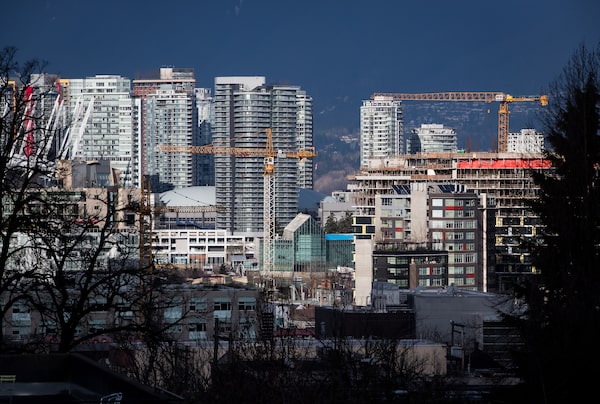
Construction cranes tower above condos under construction near southeast False Creek in Vancouver on Feb. 9, 2020.DARRYL DYCK/The Canadian Press
Federal Housing Minister Sean Fraser has urged Vancouver-area civic politicians to consider other options for how to pay for new housing, saying the long-standing policy of having new developments pay for new infrastructure won’t work in this crisis environment.
In a strongly worded letter dated Monday to George Harvie, mayor of Delta who is the chair of the regional Metro Vancouver board, Mr. Fraser criticized the approach that “growth should pay for growth” that many cities in Canada have used as a philosophy when deciding whether to cover the costs for new infrastructure through increased property taxes for everyone or through increased development fees applied only to new housing.
Last month, Mr. Fraser halted plans to send $79-million to cities within Metro Vancouver because of plans to double and triple some development fees. The hike in fees could dramatically increase the cost of new housing units and would offset the benefits of the extra money being provided by Ottawa, he argued.
In his letter, Mr. Fraser asked Metro Vancouver’s board to consider delaying the start date of the fee increases and to look at more provisions for eliminating fees on various forms of affordable housing.
“While I also appreciate that some hold the perspective that ‘growth pays for growth,’ we will all pay for stagnation as a result of a lower pace of construction,” he wrote.
“A ‘growth pays for growth’ approach ignores the value that new development, new property tax bases, new businesses, and new neighbours bring to our communities. I am concerned that at this particular moment in time, a drastic increase in development charges will inhibit our ability to seize the opportunity to incentivize a rapid increase in construction.”
The letter is just the latest in the new minister’s vigorous efforts to push cities across Canada into changing their policies to allow for more density and simplified, less expensive approval processes.
In letters to cities including Halifax, Hamilton, Mississauga, Calgary and Vancouver, the minister has threatened to withhold money from the new Housing Accelerator Fund program unless cities make changes.
While the letter to Metro Vancouver is about the proposed development fee increase, other cities have been urged to change their zoning policies to allow four homes on any residential lot. Mississauga Mayor Bonnie Crombie exercised new “strong mayor” powers granted by the Ontario government in order to overturn her own council’s vote against the concept in order to get the promised $120-million from the fund.
Metro Vancouver’s chief administrative officer, Jerry Dobrovolny, said regional politicians will meet Friday to discuss the minister’s demands.
“The letter provided more specific proposals. They’re proposals we can work with,” said Mr. Dobrovolny.
He noted Metro Vancouver and Mr. Fraser have the same goal of spurring much more housing construction to alleviate the extreme pressure that has led to unprecedented sale and rent increases the past couple of years.
The Metro Vancouver proposal on development fees had originally made the case that fees for new housing should be increased to cover 99 per cent of any costs related to growth. Until now, the region has covered 50 per cent of costs related to growth.
District politicians had calculated that just over half of almost $12-billion in planned improvements to the water system owes to new housing and population and so development fees for that part of the region’s infrastructure should be significantly increased.
When everything was totalled, the increase in fees for a single-family house in Vancouver or Burnaby would have amounted to $24,000, while individual apartments would see an increase of $14,650 by the end of a three-year phase-in.
Mr. Fraser’s letter suggested the board consider delaying any increases by a year, as well as looking at more types of projects that would be eligible for a waiver.
The Metro proposal had said that non-profit housing, private projects with 30-per-cent below-market units, and laneways and basement suites would be exempt from all development fees.
Mr. Fraser suggested the board look at exempting any purpose-built rental from fees and lowering the proportion of below-market units a project needed to have to qualify for a waiver.